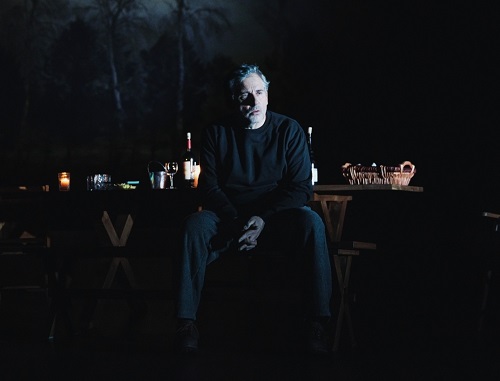The Citiblog
Review: Steve Carell is Relatively Good as Uncle Vanya
April 24, 2024, 9:00.08 pm ET

By Brian Scott Lipton
Modernized settings. Contemporary language. Unusual casting of roles. New Yorkers have become extremely used to directors “tampering” with theatrical classics, but luckily, the strongest plays survive even with these fundamental (and often unnecessary) updates.
Such is case of Lincoln Center’s relatively entertaining if often wildly misguided new production of Anton Chekhov’s “Uncle Vanya.” This classic play (which I have seen in almost countless iterations) still tugged at my heart and soul as it examines the trials and tribulations of a dysfunctional family, some of whom realize after finally examining their unexamined lives that they have wasted their time on earth.
The most noteworthy example is Vanya, played by film and TV favorite Steve Carell in a respectable Broadway debut that plays up the actor’s signature gift for being a whiny sad sack. Having given up any life he once had to take care of his late sister’s farm (though I still think of Vanya as a 47-year-old virgin), Vanya has been “content” to toil and suffer in silence until his pretentious ex-brother-in-law Alexander (a perfectly pompous Alfred Molina) and his new wife, the much younger Elena (a languorous, gorgeous Anika Noni Rose) come for a summer stay that is initially meant to be permanent.
Their presence upsets the home’s delicate balance and time-honored routines, The beyond-bored Elena beguiles – purposely and not -- Vanya as well as the romantic and yet cynical country doctor Astrov (William Jackson Harper in a brashly commanding turn), who now starts to visit the family on a daily basis.
Further complicating matters, Alexander’s unmarried daughter Sonia (an initially too upbeat Alison Pill), who has long tended the farm aside Vanya, is in love with Astrov. While she is basically aware that her affection is unrequited, she ultimately (egged on by Elena) determines to find out the truth. Is anybody happy?
For the most part, the actors play well off each other, making us believe they are an actual family. Jayne Houdyshell has little to do as Maria, who dotes on her former son-in-law Alexander more than her actual son (Vanya), but the actress is always a welcome presence. Mia Katigbak practically steals the show as housekeeper Marina, who calls everyone “sweetie” but then shows her disdain for them behind their backs, and Jonathan Hadary is perfectly cast as old family friend Waffles.
So, what’s the problem? First and foremost, director Lila Neugebauer gives us no sense of where or when the show is taking place, nor does Heidi Schreck’s problematic translation, which, among other things, refers to the house as a “dacha” in one scene, only to later say the family owes 100 bucks (not rubles). It’s one thing, as other playwrights have done, to literally relocate a Chekhov work elsewhere (at least two have been set in the Hamptons); it’s another to leave us feeling unmoored.
Both women also overemphasize the author’s famous quote that his plays are “comedies.” There are way too many yuks – many earned too easily – and not enough melancholy for my taste. And when things turn dark, Carell doesn’t quite have enough depth to pull the show’s pivotal scene off with sufficient feeling.
Mimi Lien’s first act set, which I think is meant to be the house’s backyard, is serviceable, but the act two living room set, which looks like a page torn from “Architectural Digest,” goes completely against the text. In both acts, there’s no sense of the claustrophobia that should make the residence –and the residents – feel too small. Kate Voyce’s costumes are also a mixed bag; she dresses Rose and Molina beautifully, but Harper just looks sloppy.
I’d be a bit more forgiving of this production if it was part of some free summer festival rather than the big Spring offering from one of our finest institutional theaters. But I wasn’t sorry I saw it, and I imagine you won’t be either.
SEE DETAILS/TICKETS
OUR LATEST BLOG POSTS

Last-Minute Mother's Day Gift Guide
May 4, 2024, 7:58 am ET
Looking for some gift ideas for Mother's Day? Check out these Culinary Treasures for Mom! Danny Loves Pasta by popular TikToker, Danny Freeman (Amazon) With fans like Giada De Laurentiis, Andy Coh... READ MORE

Glace Unveils Bad Roman Frozen Hot Chocolate
May 3, 2024, 10:34 pm ET
Glace, the sweet shop founded by culinary dreamer Sasha Zabar, son of famed New York gourmand, Eli Zabar, is kicking off spring with a special frozen hot chocolate. Available from May 2nd-5th at Gla... READ MORE

Artist Elisabetta Zangrandi Showcased at Sag Harbor’s Keye’s Art
May 3, 2024, 10:17 pm ET
Image: e Italian artist Elisabetta Zangrandi/Keye's Art Working in a small mountain village outside Verona, the Italian artist Elisabetta Zangrandi has toiled over the past year to create a portrait ... READ MORE


 Sign up for our newsletter !
Sign up for our newsletter !